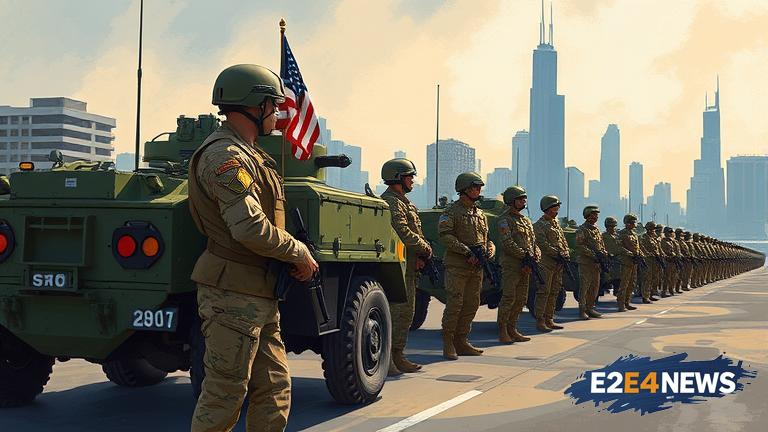The city of Chicago is bracing itself for a potential deployment of the US National Guard, following a pattern of similar deployments in other major cities across the country. The move is aimed at maintaining law and order, as well as protecting citizens and property from potential harm. The decision to deploy the National Guard is typically made by the state governor, in consultation with local law enforcement agencies and other stakeholders. In recent months, several cities have seen the deployment of the National Guard, including Los Angeles, New York, and Washington D.C. The deployments have been in response to a range of issues, including protests, riots, and natural disasters. The situation in Chicago is being closely monitored, with officials weighing the need for additional support to maintain public safety. The city has experienced its own share of protests and demonstrations in recent months, with some turning violent. The potential deployment of the National Guard has sparked debate among locals, with some welcoming the move as a necessary measure to maintain order, while others have expressed concerns about the potential for militarization and the impact on civil liberties. The US National Guard is a reserve component of the US Armed Forces, comprising citizen-soldiers who can be called upon to serve in a variety of roles, including domestic law enforcement and disaster response. The Guard has a long history of deployment in support of civil authorities, dating back to the early 20th century. In recent years, the Guard has been deployed in response to a range of crises, including hurricanes, wildfires, and civil unrest. The deployment of the National Guard is typically subject to strict guidelines and protocols, designed to ensure that the rights of citizens are protected while maintaining public safety. The use of the National Guard in domestic law enforcement is governed by a range of federal and state laws, including the Posse Comitatus Act, which prohibits the use of the military in domestic law enforcement except in certain limited circumstances. Despite these safeguards, the deployment of the National Guard can still be a contentious issue, with some arguing that it represents an overreach of military authority and a threat to civil liberties. Others argue that the Guard plays a vital role in supporting civil authorities and maintaining public safety, particularly in times of crisis. As the situation in Chicago continues to unfold, officials are urging calm and restraint, while also emphasizing the need for public safety and order. The potential deployment of the National Guard is just one aspect of a broader response to the challenges facing the city, which includes increased policing, community outreach, and social support programs. The city’s mayor and other officials have pledged to work closely with local communities and stakeholders to address the underlying issues driving the protests and demonstrations. The situation in Chicago is being closely watched by other cities across the country, which are facing similar challenges and considering similar responses. The use of the National Guard in domestic law enforcement is likely to remain a topic of debate and discussion in the coming months and years, as the country grapples with the complexities of maintaining public safety while protecting civil liberties. In the meantime, the people of Chicago and other cities affected by the deployments will be watching closely, as the situation continues to unfold. The city’s residents are bracing themselves for the potential consequences of the deployment, including increased militarization and restrictions on civil liberties. The deployment of the National Guard is a serious step, and one that is not taken lightly. It represents a significant escalation of the response to the challenges facing the city, and one that will have far-reaching consequences for the people of Chicago and beyond.
